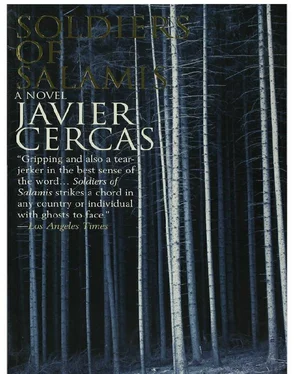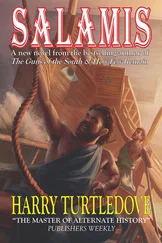It was also thanks to Jaume Figueras, who finally kept his word and acted as diligent intermediary, that I got to speak to his uncle Joaquim, Maria Ferré and Daniel Angelats. All three were over eighty: Maria Ferré was eighty-eight; Figueras and Angelats, eighty-two. All three still had good memories, or at least they still remembered their encounter with Sánchez Mazas and the circumstances surrounding it, as if it had been a determining moment in their lives and they'd often recalled it. Their three versions differed, but weren't contradictory, and at more than one point they were complementary, so from their testimonies, and filling in the gaps they left by means of logic and a little imagination, it wasn't difficult to reconstruct the puzzle of Sánchez Mazas' adventure. Perhaps because no one has time any more to listen to people of a certain age, much less when they start remembering incidents from their youth, all three were anxious to talk, and more than once I had to channel the disorderly flow of their recollections. I can imagine they might have embellished some secondary factors, some lateral details; not that they lied, because among other reasons, if they had, the lie wouldn't have fitted into the puzzle and would have given them away. In all other respects, the three of them were so different that to my eyes the only thing that linked them was their condition as survivors, that deceptive added prestige the protagonists of the bland, routine inglorious present, often concede to the protagonists of the past, which because we only know it through the filter of memory, is always extraordinary, tumultuous, heroic: Figueras was tall and well-built, with an almost youthful air checked shirt, sailor's cap, well-worn jeans a travelled man, possessing an enormous vitality and a conversational manner erupting with gestures, exclamations and hearty laughs; Maria Ferré who, according to what Jaume Figueras told me later, had coquettishly visited the hairdresser's before receiving me in her house in Cornellá de Terri a house that at times had been the village bar and general store, and still at the entrance, almost like relics, stood a marble counter and a set of scales — was slight and sweet, digressive, with eyes that at one moment were mischievous and the next would brim with tears at her inability to dodge the tricks nostalgia set for her in the course of her tale, young eyes, with the colour and fluidity of a summer stream. As for Angelats, my interview with him was crucial. Crucial for me, I mean — or, more precisely, for this book.
For many years, Angelats ran a boarding house in part of a decrepit and beautiful country house in the centre of Banyoles with a large pillared courtyard and immense gloomy lounges. When I met him he'd just survived a heart attack and he was a morose, diminished man, whose gestures, of an almost abbotlike solemnity, contrasted with the childish innocence of many of his observations and the deliberate humility of his Catalan small businessman's demeanour. I don't know if I'm exaggerating here, but I believe that Angelats, like Figueras and Maria Ferré, felt flattered in a way by my interest in him; I know he very much enjoyed remembering Joaquim Figueras — who'd been his best friend for many years and whom he'd not seen for quite some time — and their shared adventure during the war, and while I heard him make an effort to present it as a youthful escapade without the least importance, I guessed it meant all the world to him, perhaps because he felt it had been the only real adventure in his life, or at least the only one he hadn't needed to fear feeling proud of. He spoke to me about it at length; then he told me about his heart attack, how his business was going, his wife, his children, his only granddaughter. I realized he'd needed to talk to someone about these things for a long time; I realized I was only listening to him in compensation for him having told me his story. Ashamed, I felt sorry for him and, when I felt I'd repaid my debt, I tried to say goodbye, but since it had started to rain Angelats insisted on seeing me to the bus stop.
'Now that I think of it,' he said as we crossed the puddle-strewn plaza under his umbrella. He stopped, and I couldn't help but think that this memory was nothing but a last minute decoy, to make me stay. 'Before he left, Sánchez Mazas told us he was going to write a book about all that, a book with us in it. He was going to call it Soldiers of Salamis-, strange title, don't you think? He also said he'd send it to us, but he didn't.' Angelats looked at me now: the light from the street-lamp put a yellow reflection on the lenses of his glasses, and for a moment I saw in his bony eye sockets and in the prominence of his forehead and cheeks and in his open jaw the outline of his skull. 'Do you know if he wrote the book?'
A cold shiver ran up my spine. I was about to say yes; I thought just in time: 'If I tell him he wrote it, he'll want to read it and discover my lie.' Feeling I was somehow betraying Angelats, I said brusquely:
'No.'
'No, he didn't write it or you don't know if he wrote it?'
'I don't know if he wrote it,' I lied. 'But I promise I'll find out.'
'Do that.' Angelats started walking again. 'And, if it turns out he did write it, I'd appreciate it if you'd send it to me. It's sure to mention us, as I told you he always said we saved his life. I'd really like to read that book. You understand, don't you?'
'Of course,' I said and, not yet feeling completely rotten, I added: 'But don't worry: as soon as I find it I'll send it to you.'
The next day, as soon as I got to the newspaper I went to the editor's office and negotiated a leave of absence.
'What?' he asked ironically. 'Another novel?'
'No,' I answered smugly. 'A true tale.'
I explained what I meant. I explained what my true tale was about.
'I like it,' he said. 'Have you got a title yet?'
'I think so,' I answered. 'Soldiers of Salamis.'
* Quiso Dios, con su poder,/ fundir cuatro rayitos de sol/ y hacer con ellos una mujer,/ y al cumplir su voluntad/ en un jardin de España naci/ como la flor en el rosal./ Tierra gloriosa de mi querer,/ tierra bendita de perfume y pasion,/ España, en toda flor a tus pies/ suspira un corazon./ Ay de mi pena mortal,/ porque me ale jo, España, de ti,/ porque me arrancan de mi rosal.
Part Two. Soldiers Of Salamis
ON 27 APRIL 1939, the very day that Pere Figueras and his eight comrades from Cornellá de Terri were sent to prison in Gerona, Rafael Sánchez Mazas had just been named national advisor to the Falange Española Tradicionalista y de las JONS and Vice-President of its Leadership Council; a month had not yet passed since the definitive collapse of the Republic, and four more were yet to go by before Sánchez Mazas would become Minister Without Portfolio in the first post-war government. He had always been an unpleasant, arrogant, despotic man, but was neither petty nor vindictive, and so during that period the waiting room to his office teemed with relatives of prisoners eager to gain his intercession on behalf of old acquaintances or friends who the end of the war had left confined in the cells of the defeat. Nothing leads us to believe he did not do what he could for them. Thanks to his insistence, the Caudillo commuted the death sentence hanging over the head of the poet Miguel Hernández to life imprisonment, but not the one which, one November dawn in 1940, led a firing squad to end the life of Julian Zugazagoitia, a good friend of Sánchez Mazas and Minister in Negrín's government. Months before this pointless murder, just back from a trip to Rome as National Delegate of the Falange Exterior, his secretary, the journalist Carlos Sentís, brought him up to date on matters pending and read him the list of persons he'd granted an audience for that morning. Suddenly alert, Sánchez Mazas made him repeat a name; then he stood up, strode across his office, opened the door, stopped in the middle of the waiting room and, scouring the frightened faces crowding it, asked: apos;Which of you is Joaquin Figueras?'
Читать дальше












